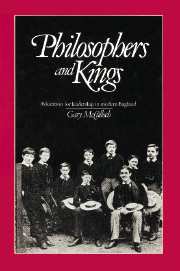3 - The end of the old school tie?
Published online by Cambridge University Press: 16 November 2009
Summary
In the darkest days of the second world war, the public schools faced a crisis of their own. Declining enrolments and growing financial problems were not the sole source of anxiety: even more perturbing were strong criticisms of their general social purposes that threatened to lead to their destruction or emasculation. That they survived to prosper once again was due in no small measure to the Fleming report on public schools and the general educational system, published in 1944. The ‘old school tie’ continued to exert a strong influence on English society. Even so, the public schools of the postwar period were in some respects significantly different from those of the classic phase half a century earlier, and this adaptation to changing circumstances affected their role and rationale as the main producers of future leaders.
DEMOCRACY AND THE PUBLIC SCHOOLS
It has become conventional wisdom that the first world war marked a decisive period in the decline of the public schools and the values associated with them. According to Mark Girouard, for instance, the Great War ‘both brought Victorian chivalry to its climax and helped to destroy it’. He explains: ‘As a dominant code of conduct it never recovered from the Great War partly because the war itself was such a shatterer of illusions, partly because it helped produce a world in which the necessary conditions for chivalry were increasingly absent.’
- Type
- Chapter
- Information
- Philosophers and KingsEducation for Leadership in Modern England, pp. 23 - 40Publisher: Cambridge University PressPrint publication year: 1991



